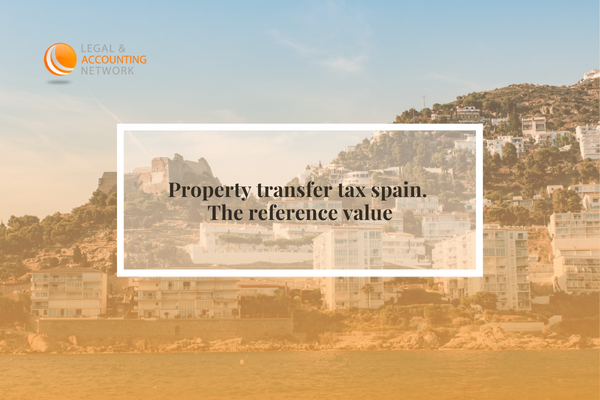General Information, concepts and taxes when purchasing a property in Spain.
To begin with, it is important to know that there is a difference between the cadastral value, which is the property value that is updated by “Leyes de Presupuestos Generales del Estado”, and serves as the basis for the real estate tax IBI and that is a private information, and on the other hand, the reference value, that will be determined year by year, and will serve as the tax base for Property Transfer Tax (ITP), Stamp Duty (AJD), and Inheritance and Gift Tax (Donacion y Sucesiones) and is of public information.
When purchasing a property in Spain there is a tax involved called property transfer tax. From January 2022, this tax, as well as the inheritance and the donation tax, is affected by a new ‘reference value’ called “Valor de Referencia”
If you have property in Spain or are considering buying one here, then you should be aware of the newly introduced ‘reference value’. This value will determine how much “transfer tax” you must pay when your property is transferred to another owner, normally is based on actual sales prices in the area and is established by the Administration. The exact amounts will be updated periodically based on property sale values recorded by notaries and registrars in the previous six months.
On that reference value, the Treasury applies a reduction coefficient of 0.9, which in practice represents a reduction of 10%. The objective of this reduction is that the reference value is below the market value.
It is important to bear in mind that in some situations the “reference value” is very close to the real value of the real estate transferred, but we have also observed numerous cases in which there is a “reference value” that is totally disproportionate and disconnected from the market value.
After all this information, you have probably asked yourself these questions…
I. What if I do not use the minimum tax value to my purchase?
The buyer will receive a notification from the Tax authorities with a fiscal liquidation, in which he will have to pay the tax that was not paid in the deed of purchase, being this amount the difference between the reference value and the value of the deed, plus interests.
II. What happens if the taxpayer does not agree?
The new owner must first pay the ITP requested by the Administration. Then, ask for a rectification to the Tax Agency and prove with evidence that the real value of the house is 150,000 euros and not 200,000 euros e.g. To do this, you must hire a lawyer and an expert to clean the house and in many cases, the reference value will be assumed even if it is higher because it will not compensate to resort to it.
III. What resources do we have to appeal the reference value?
The first one would be to pay tax according to the reference value and then claim the rectification of the tax assessment that has already been made together with the refund of undue income.
The second way would be to pay tax on the value of the deed, which will be lower than the reference value, and then appeal the notification that has been notified, but with the consequence that you will also have interest for late payment.
IV. Could the administration penalize me if I do not apply this reference value?
Of course, the penalty would be equal to 50% of the unpaid tax and a 30% reduction may be applied if the taxpayer pays within the term established by the Administration to liquidate the tax.
V. And what about properties with no tax value…?
It is clear that there are still properties that do not have this official reference value associated with them. For this reason, the value stated in the deed will be understood as the market value of the property and, if the administration determines otherwise, it must itself initiate a procedure to verify the reference value.
Implicit tax hike
In this way, this change in the value of the property could lead to a tax increase. Because the valuation will be generic, analysing how the sales have been in the area where it is located without taking into account relevant aspects such as the state of conservation of the property or the qualities with which it was built.
And even if the percentage of tax to be paid does not increase, it could mean that people have to pay more because the property has a new value attributed to it.
So, If a person who buys a first floor for 250.000 € could find a reference value of 350.000 and have to pay taxes for this amount.
How does it affect the Autonomous Communities?
The amount collected will be higher for the autonomous communities since the taxpayer will have to pay more for the ITP and ISD, although the measure will not affect the taxation they have determined to a great extent.
Therefore, they would have to reduce tax rates if they wanted to maintain collections at previous levels at the reference value.
The amount collected will be higher for the autonomous communities since the taxpayer will have to pay more for the ITP and ISD, although the measure will not affect the taxation they have determined to a great extent.
Therefore, they would have to reduce tax rates if they wanted to maintain collections at previous levels at the reference value.
Others Taxes affected.
On the other hand, the impact of this value would also affect the Inheritance and Donation tax. This implies that the Treasury will charge these taxes on the valuation of the property that is higher, either that of the reference value or that of the deed.
Then, whether you have bought or inherited a home, you must also pay the Wealth Tax. In this case, it is applied on the largest of these three values: the cadastral, the real or the reference.
Of course, the Treasury has clarified that the reference value in terms of Heritage will be applied to the properties that have been transferred from 2022 and not on those that were previously declared. That is, if a person owned before that date tow homes valued at 500.000 euros, for example, he will continue to be taxed for that same amount and not for what would mark the reference value.
(As an example, in inheritances between direct relatives it can be interesting to declare a high value for the Real Estate (even higher than the CRV), because it can help you to save taxes in the future:
-More depreciation expense if rented.
-Less gain in IRPF when transferring (if it was inheritance in life, wait 5 years or death)
-Less Municipal Capital Gains Tax when transferring (with new option of taxing on real increase, according to deeds).
Likewise, it is necessary to be cautious with these high values declared for the Real Estate since they can give rise to high quotas for Patrimony Tax in the next years.
Lastly, it does not affect all property taxes, for example IBI or municipal tax will not be modified and will continue to be based on the cadastral value.







